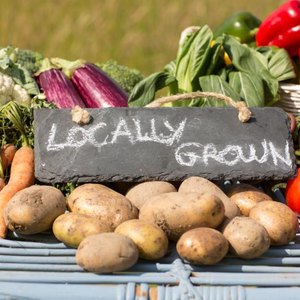
Purchasing organic food stocks is a natural choice for investors wishing to add eco-friendly ingredients to their portfolios. Green-chip investments can be financially rewarding, even during a recession, as growing numbers of consumers awaken to the environmental implications of their purchases. Organic food and beverage sales in the United States have grown from $1 billion to $25 billion in the last two decades with global sales reaching $51 billion in 2008.
Whole Foods Markets
Founded in 1980, Whole Foods Markets (Nasdaq: WFMI) has 270 outlets in North America and the United Kingdom. Recognized as a world leader in high-quality natural and organic foods, the chain heavily promotes its mission statement, “Whole Foods, Whole People, Whole Planet.” Fortune magazine placed the company in its “100 Best Companies to Work for in America” 13 years in a row.
Purchasing organic food stocks is a natural choice for investors wishing to add eco-friendly ingredients to their portfolios. Green-chip investments can be financially rewarding, even during a recession, as growing numbers of consumers awaken to the environmental implications of their purchases. Organic food and beverage sales in the United States have grown from $1 billion to $25 billion in the last two decades with global sales reaching $51 billion in 2008.
United Natural Foods
Two independent organic food distributors on opposite coasts of the United States, Mountain Peoples Warehouse and Cornucopia Natural Foods, merged in 1996 to become United Natural Foods (Nasdaq: UNFI). Since then the company has become the world's largest publicly traded organic food wholesaler, supplying 7,000 retailers in the United States and Canada with more than 6,000 individual products.
Purchasing organic food stocks is a natural choice for investors wishing to add eco-friendly ingredients to their portfolios. Green-chip investments can be financially rewarding, even during a recession, as growing numbers of consumers awaken to the environmental implications of their purchases. Organic food and beverage sales in the United States have grown from $1 billion to $25 billion in the last two decades with global sales reaching $51 billion in 2008.
The Hain Celestial Group
The Hain Food Group (Nasdaq: HAIN) merged with Celestial Seasonings in 2000 to become the Hain Celestial Group, manufacturer of natural and organic foods and personal-care products under dozens of brand names, including Arrowhead Mills, Earth's Best, Hain Pure Food and Westbrae Natural. Even with a nearly 20 percent ownership stake by the Heinz company, as of October 2010 some analysts consider Hain Celestial to be a potential acquisition target, which may affect its stock price.
Purchasing organic food stocks is a natural choice for investors wishing to add eco-friendly ingredients to their portfolios. Green-chip investments can be financially rewarding, even during a recession, as growing numbers of consumers awaken to the environmental implications of their purchases. Organic food and beverage sales in the United States have grown from $1 billion to $25 billion in the last two decades with global sales reaching $51 billion in 2008.
Keurig Green Mountain Coffee Roasters
Keurig Green Mountain Coffee Roasters (Nasdaq: GMCR) encourages sustainable and fair business practices with a set of vendor expectations. Worker wages, benefits, conditions and rights are monitored in coffee growing and packaging centers in South America, Indonesia, Africa and China to ensure a healthy and prosperous supply chain. A leader in specialty coffee, the company supplies to name brands such as Newman's Own, Tully's, Timothy's and Keurig.
Purchasing organic food stocks is a natural choice for investors wishing to add eco-friendly ingredients to their portfolios. Green-chip investments can be financially rewarding, even during a recession, as growing numbers of consumers awaken to the environmental implications of their purchases. Organic food and beverage sales in the United States have grown from $1 billion to $25 billion in the last two decades with global sales reaching $51 billion in 2008.
Annie's Inc.
Annie's (Nasdaq: BNNY) specializes in natural and organic foods made from high-quality ingredients. The company avoids artificial flavors, synthetic colors and preservatives. As of July 2014, Annie's offered 145 products in 35,000 retail locations throughout North America. Its main distribution channels are mass merchandisers, mainstream grocers and natural food retailers. The company has adopted a socially responsible mission statement that encourages an open and honest corporate culture.
References
Writer Bio
Based in Vancouver, Lyle Osinchuk has been writing since 1984 and has been published on eHow. He works behind the scenes in the film and television industries. Osinchuk holds a Diploma of Technology in broadcasting from the British Columbia Institute of Technology.

